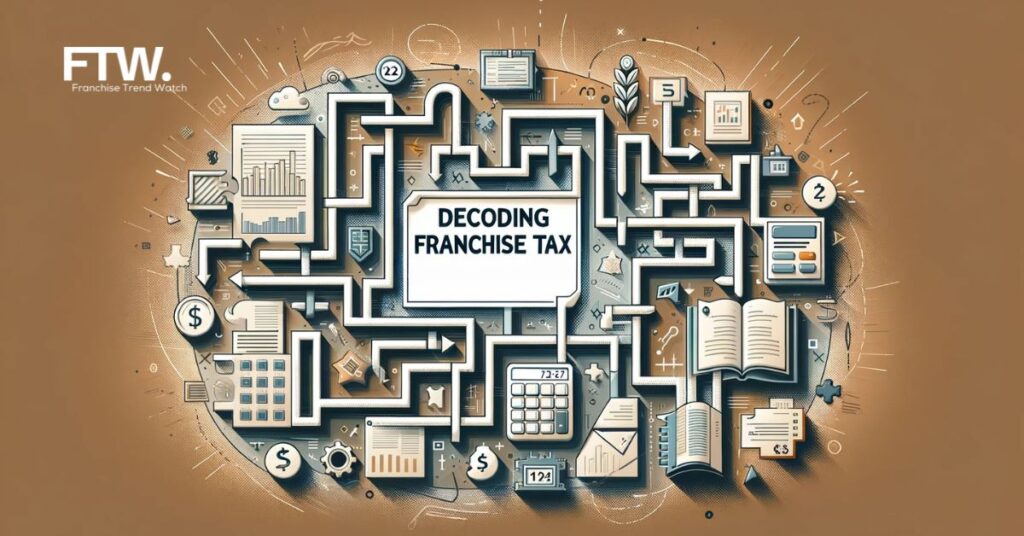Franchise businesses play a significant role in the economy, providing aspiring entrepreneurs with ready-made business models and established brand recognition. However, owning a franchise also comes with certain financial obligations, including franchise taxes.
Understanding and effectively managing franchise taxes are crucial for franchise owners to ensure compliance and optimal financial planning.
In this comprehensive guide, we will delve into the basics of franchise tax, explain how it is calculated, and provide valuable tips for franchise owners to navigate the world of franchise taxes effectively.
Explaining the Basics of Franchise Tax
Franchise tax is a type of tax imposed on businesses that operate as franchises. It is separate from income tax and is specific to franchise operations.
Understanding the basics of franchise tax is essential for franchise owners to accurately assess their financial obligations and effectively plan their finances.
Here, we’ll cover the fundamental aspects of franchise tax.
What is Franchise Tax?
Franchise tax is a state-level tax imposed on certain businesses that operate in the form of franchises. The tax is generally based on the gross revenue or net worth of the franchise.
It is important to note that franchise tax rates and regulations vary from state to state, so franchise owners must be familiar with the specific requirements in their operating jurisdiction.
Why is Franchise Tax Relevant to Franchise Businesses?
Franchise tax serves as a revenue source for states and is linked to the privilege of operating a franchise within their boundaries. It helps fund essential public services and infrastructure projects, contributing to the economic development of the state.
Franchise owners must familiarize themselves with franchise tax requirements to fulfill their legal obligations and contribute to the communities they operate in.
A Breakdown of How Franchise Taxes Are Calculated and Applied
Understanding how franchise taxes are calculated is vital for franchise owners to accurately estimate their tax liabilities and plan their financial strategies accordingly.
While the specific calculations and application methods may vary from state to state, we can outline a general breakdown of the factors involved.
Gross Revenue vs. Net Worth
The two primary methods used to calculate franchise taxes are based on either gross revenue or net worth. Let’s explore each method:
1. Gross Revenue Method
Under this method, franchise tax is calculated based on a percentage of the franchise’s gross revenue. The percentage can vary depending on the state.
For example, a state may impose a 1% franchise tax rate on a franchise’s gross revenue. Franchise owners should accurately record and report their gross revenue to calculate their franchise tax liabilities.
2. Net Worth Method
Alternatively, some states calculate franchise taxes based on the net worth of the franchise. Net worth is determined by subtracting certain liabilities from the franchise’s total assets. The state will then apply a tax rate to the resulting net worth amount to calculate the franchise tax liabilities.
Franchise owners must maintain accurate financial records to determine their net worth and fulfill their tax obligations.
Additional Factors and Considerations
In addition to the basic calculation methods mentioned above, franchise tax regulations may include additional factors and considerations. These can include minimum tax payments, brackets based on revenue or net worth, exemptions for small businesses, and special provisions for specific industries or franchise types.
Franchise owners should thoroughly research the franchise tax laws in their respective states and consult professionals, such as accountants or tax advisors, with expertise in franchise taxes. This ensures accurate calculations and compliance with state regulations.
Tips for Franchise Owners to Manage and Plan for Franchise Taxes Effectively
Managing and planning for franchise taxes effectively is crucial for franchise owners to maintain financial stability and compliance.
Here are some essential tips to optimize franchise tax management:
1. Stay Informed
Franchise owners must stay informed about the specific franchise tax regulations and requirements in their operating state. Regularly review official sources such as state tax department websites or consult with tax professionals to ensure compliance.
Changes in tax laws can occur, so staying informed is key.
2. Maintain Accurate Financial Records
Accurate financial records are essential for franchise tax calculations and audits. Keep detailed records of revenue, expenses, and assets. Utilize accounting software or consult with financial professionals to ensure accurate record-keeping.
3. Consult Tax Professionals
Tax regulations can be complex, especially when it comes to franchise taxes. Seeking advice from tax professionals with franchise tax expertise can provide invaluable guidance.
These professionals can assist in accurately calculating franchise taxes, maximizing deductions, and ensuring compliance with state regulations.
4. Optimize Deductions and Credits
Franchise owners should familiarize themselves with the deductions and credits available specifically for franchise businesses. These may include deductions for business expenses, employee benefits, or credits for job creation or energy-efficient initiatives.
Maximizing eligible deductions and credits can help minimize franchise tax liabilities.
5. Plan Cash Flow and Budgeting
Franchise owners should incorporate franchise tax obligations into their cash flow planning and budgeting processes.
By allocating funds specifically for franchise taxes, businesses can avoid cash flow issues and penalties.
By planning, franchise owners can ensure they meet their tax obligations without negatively impacting their operations.
6. Seek Professional Assistance
When in doubt or facing complex tax situations, franchise owners should not hesitate to seek professional assistance.
Tax professionals specializing in franchise taxes can provide personalized advice and ensure compliance with state regulations. Their expertise can ultimately save time, money, and potential legal issues.
Decoding Franchise Tax
Understanding franchise tax and effectively managing related obligations is crucial for franchise owners.
By grasping the basics of franchise tax, calculating tax liabilities accurately, and implementing effective tax management strategies, franchise owners can navigate the complexities of franchise taxes seamlessly.
Staying informed, maintaining accurate financial records, seeking professional advice, and planning cash flow and budgeting are essential components of successful franchise tax management.
By integrating these practices into their business operations, franchise owners can ensure legal compliance, optimize tax liabilities, and dedicate more resources to business growth and expansion.





